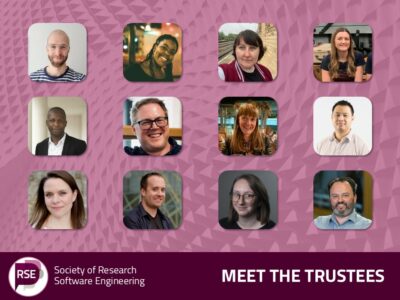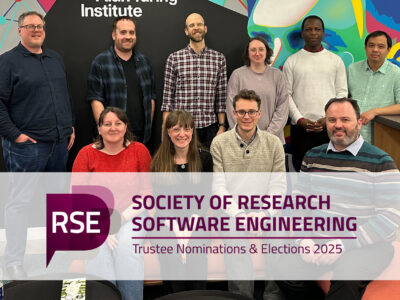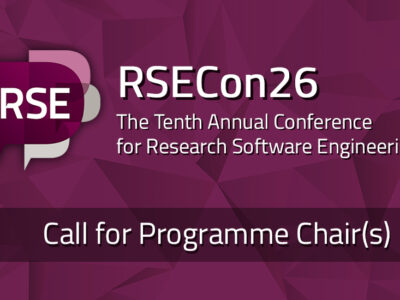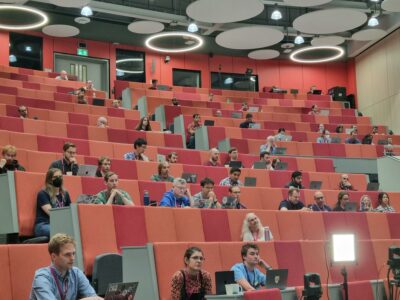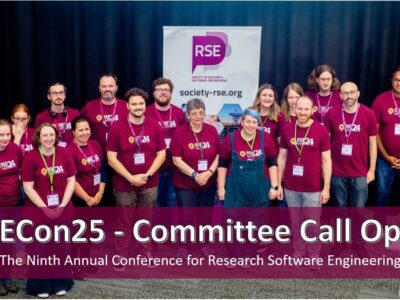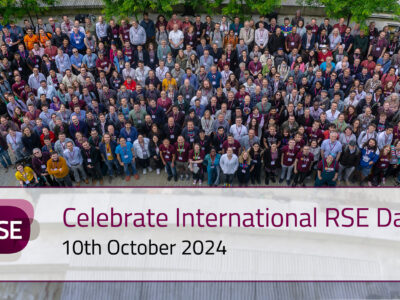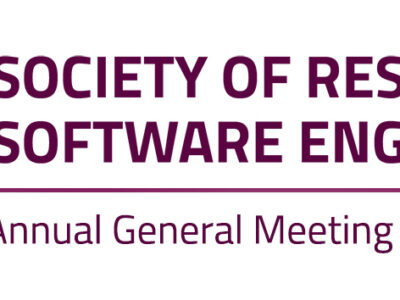Webinar: EPSRC RSE Fellowship Call 2020
The EPSRC are running a call for Research Software Engineer (RSE) Fellowships this summer. The full call announcement was made available on the 30th of June 2020 and the closing date for the initial outline is the 18th of August 2020.
Given the very strong interest in previous calls, the community organised a webinar on the 7th of July 2020 to answer questions the community members might have before applying for an RSE Fellowship. Representatives from EPSRC, the Society of Research Software Engineering as well as current RSE Fellows were all present on the panel.
The webinar was recorded and can be found on the Society’s YouTube channel here with the Q&A below.
We’re also discussing the call in the RSE Slack space, #rse_fellowships_2020 channel. If you are from a pre-approved institution you can signup here. Alternatively, you can request access.
Q&A from the webinar:
Question: As like I suspect most RSEs I’m currently employed to do software for other’s research and I wonder if / how that would work with this fellowship. Answer: It’s a way to bring about transformation with researchers and show how your software is important to the research area. Don’t be over ambitious.
Question: Call states host org must “provide a mechanism for Fellow to transition to perm role at the institution at end of Fellowship.” What would be a satisfactory mechanism? Answer: From an institutional perspective, you have to have a method through which you can provide value. Key is transitioning to a permanent role. Many different types of permanent roles within the RSE space. What would that role look like? It’s difficult to dictate to the institutions what a transitioning mechanism would be. We’re looking for what the institution could offer from amongst their range of support. It needs to look like they actually care about the RSE career. You can transfer your fellowship to another institution but you need to do this near the beginning of your fellowship.
Question: EPSRC Staff: What about projects in the NERC remit? Answer: On this call in particular, we are looking predominantly within the EPSRC and STFC remit. At this point in time, this call is being run within EPSRC. There is a move to go more cross council in the future. (Kieran Jarrett from UKRI EPSRC commented in the chat ‘I would encourage those of you in NERC remit to contact NERC software/HPC teams and community leaders to highlight potential needs and benefits of a programme in this area. It will inform their thinking as the UKRI level processes evolve.’)
Question: EPSRC staff: Is this fellowship open to academic staff, i.e. lecturers, readers, professors, or restricted to those whose job title or role falls within RSE? Answer: It isn’t restricted to any particular job title or path but need to show the combination of research and software engineering. Show that you have a RSE approach to software engineering if you are mostly in a research track. Show that your proposal isn’t something you can do in your normal job. Show the transformative aspect for you with this fellowship. Somebody who is quite senior would need to outline how the fellowship would help them achieve their career aspirations and if the fellowship is an appropriate route for them. Job title – very few people were employed as RSEs in the beginning and it’s great to see this now developed as people use it more and more. It’s great people can attract people from all roles in academia.
Question: For EPSRC: Will fellows need to be affiliated with an academic departmt or will this allow for centrally-located RSE fellows (e.g.in IT/Research IT departments)? Answer: It doesn’t matter where you are seated. There is no preference for either.
Question: How to negotiate a permanent position with a University? Answer: Strength of support letter. Build a business plan, show the income you expect to gain over several years and the routes that you think you will get this. Get to know the contacts in the university and build this up gradually. If you look profitable, then you will be able to negotiate a permanent position. Have a very focused view of how to add to the university. Understand your university’s strategy and how you will fit your career within the university. Crucial to get the letter of support and think about how you are embedded in the political landscape and how you show your value to your institution. Develop a relationship with local leadership to help shape your funding application and where you can fit in, in the future.
Question: Is the Fellowship to pay salary for the awardee or can it be spent differently? How is it usually spent? Answer: Salary is one of the usual items that it is spent on. Employing somebody else entirely from the fellowship if your salary is already paid for by the institution isn’t really in the spirit of the fellowship call. You could use the recovered salary to employ somebody else? Can be employed full time and in place at an institution, you can vacate the post you already have and hire into the vacated post.
Question: My computational methods are physical & chemical, my applications are biological. Any advice on how computational research fits in the EPSRC remit for the call? Answer: This is quantitative biology. The underlying mechanism are physical to tackle biological problems. This is fully within EPSRC remit. These are growth areas. You need to address how your software will address these areas. You could email Sarah King at EPSRC to confirm that it is in the EPSRC remit. A previous fellow Leila, has a background of CS and works in biology.
Question: The call specifies a PhD or “equivalent experience”. Do any of the current RSE fellows not hold a PhD and if so, what constitutes their “equivalent experience”. Answer: Equivalent experience – combine SE experience with the application then it fits the remit. Industrial experience is equivalent experience. Research experience with SE experience is equivalent.
Question: The form says a max of 2 applications per institute. Is that limit for the full application or does that cover the outline proposal too? Answer: That covers both the outline proposal and the full application.
Question: To EPSRC: How is the “leadership” and “ambassador” defined from RSE and EPSRC viewpoints? Answer: Leadership very much is bringing together the group or team at the local and community level to grow an RSE model that you’d like to take forward. We’ve seen examples of this leadership in the last few years where we’ve taken the RSE model to different countries. Ambassador is showing how RSE work and role is important. Developing communities of SEngineers and those interested in software engineering. Helps to gain in quality of outputs in institutions. Can go beyond your institution. Need to show how it will add to the provision that already exists. Pick a dimension of your experience and seeing how it’s not well served and how you’d like to develop it, bring in partnerships. Convince others of it. Part of the leadership is employing somebody on the fellowship call. Leadership in software. Important to have people follow you and evidence that people have taken notice of what you’ve done.
Question: To EPSRC: what will be the composition of the EPSRC assessment panels in all the three stages? What expertise the reviewers will have, skills and job title? Answer: The Panel will be made up from RSEs, RSEs Fellows, people who are leaders of the groups, from the EPSRC strategic advisory team. Panel members from industry and suggestions from the Software Sustainability Institute and members who cover the STFC element too.
Question: To fellows: if you have hired someone as part of your fellowship, how did you integrate them into your project and what have you learned from being a manager? Answer: Learning from them as much as they learn from you. You co -evolve the project with them. Managing can be personally rewarding.
Question: To past/current fellows – has the overall shape of the fellowship matched what you expected? How have things changed as or since you’ve been a fellow? Answer: It wasn’t what I expected and I did have a community portion in it. I’ve got more involved in the community than I thought I was going to. So far yes! Not to underestimate how long community work takes! I’m only 2 years in and I find I’m managing the RSE work at least as much as I am coding. Be prepared to shape policy and get involved in policy if you’ve committed to that.
Question: What about RSEs from biomedical/biological/life sciences. Is there scope for them to apply to this call? Answer: Biomedical sciences is very multi-disciplinary. I applied to EPSRC to be able to work on other projects. Yes there is scope and you can collaborate with mathematicians, physicists etc. As long as it’s primarily within the EPSRC and STFC remit, it’s eligible.
Question: What is the success rate? Answer: It’s a low success rate in previous fellowships. Many applications for a handful of fellowships.
Question: What kind of track record are you looking for people applying? And do our institutions affect our applications? Answer: Don’t assume what the track record should be. This fellowships supports atypical applications. Contact the past fellows about how they got the institution support. We are looking for a broad range of applicants, across the board. Looking for people looking to re-establish themselves after career break. As much variety as possible. Institutional support is very very important. Generic letters and support is obvious and spotted by the panellists. The applicant and institution needs to work together, a negotiation between these two parties.
Question: What’s the best place to find a list of current fellows and their project descriptions? Answer: Grants on the web for the 2017 Interview panel, https://gow.epsrc.ukri.org/NGBOViewPanel.aspx?PanelId=1-51CBP4
Grants on the web for the 2015 Interview panel, https://gow.epsrc.ukri.org/NGBOViewPanel.aspx?PanelId=1-37M3ND

